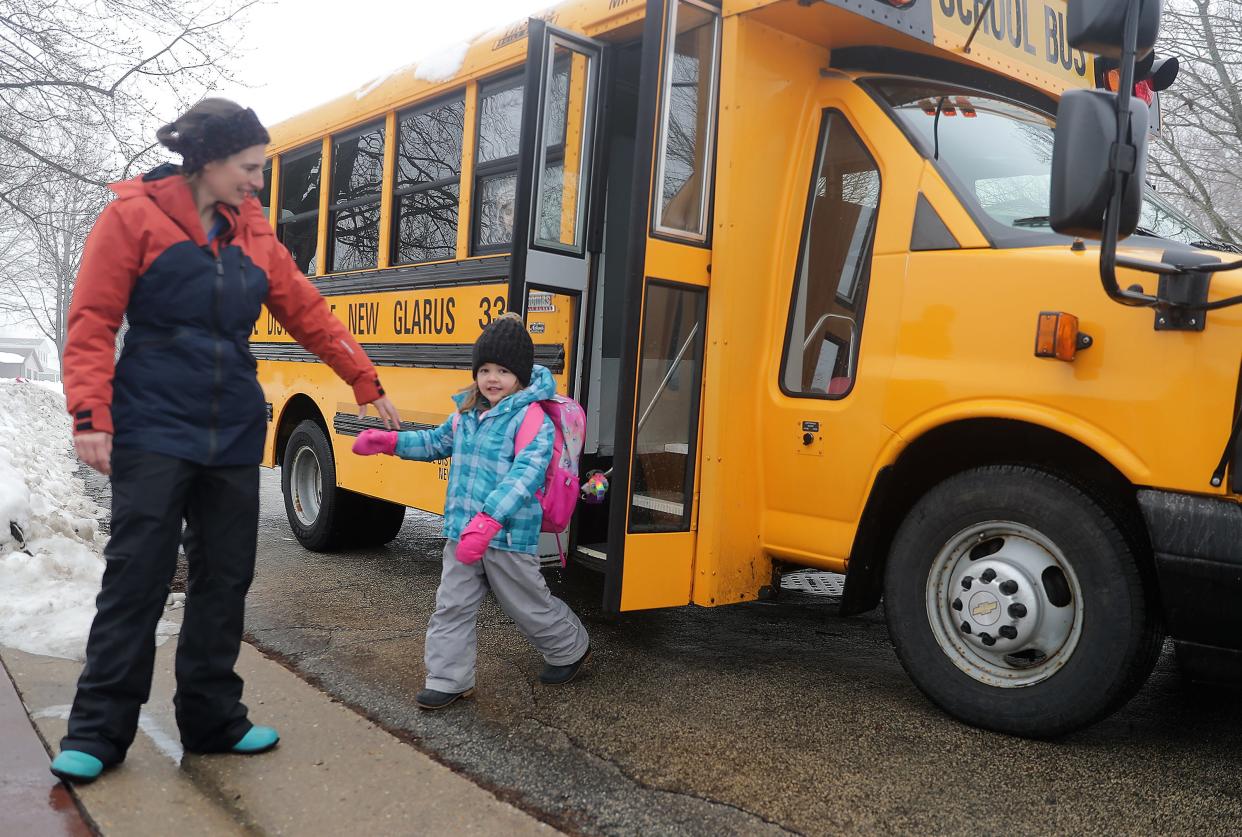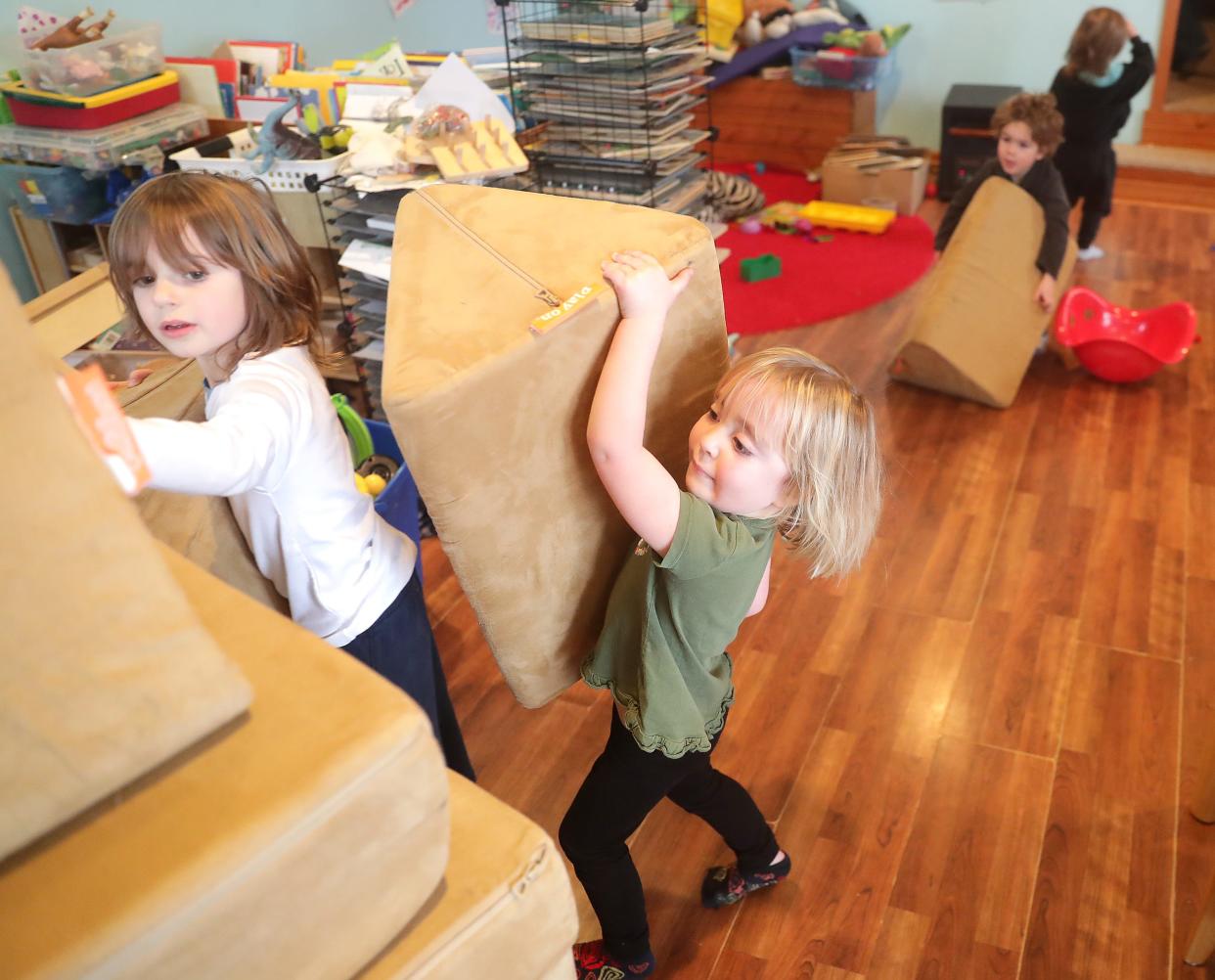New 4K bill could help child care, but at the expense of schools?
Many Wisconsin child care providers have long said the state’s public 4-year-old kindergarten structure has jeopardized their businesses. A new bill aims to help, but some warn it could harm school districts.
The legislation, which is Republicans’ latest attempt to address Wisconsin’s child care woes, had two public hearings this week. In Tuesday’s Senate committee hearing, supporters stressed the bill would give Wisconsin families more free 4K options while also supporting the struggling child care industry.
Others expressed concerns that this could come at the expense of school districts’ autonomy.
The new bill would require school districts to contract with eligible early childhood education providers, including child care programs, to provide public 4K in those settings. It also would set a more uniform baseline for how much a school district must pay child care programs to offer public 4K.
Currently, Wisconsin school districts have the option to contract with other local early education providers for 4K, but are not required to do so. In cases where child care providers do not offer public 4K, parents often withdraw their children from child care and choose to instead enroll them in public 4K, which is free. The switch allows families to save substantial amounts of money; at the same time, child care providers lose valued enrollment and revenue.
If a school district doesn't offer 4K, the bill would not apply.
More: Republican lawmakers hope to change 4K in Wisconsin to bolster child care. Here's what to know.
Related: GOP bill says employers could be key to helping solve the child care crisis. But is it enough?
Bill would help secure financial stability for child care programs, supporters say
For child care providers, losing 4-year-olds packs a particularly hard punch: It costs less to take care of older children than younger children because of worker-child ratios, which are based on the children's ages. Providers often rely on the revenue generated from enrolling older children to offset the high cost of taking care of the younger ones.
Tricia Peterson is owner and director of a Juneau child care center, Future All Stars LLC, that does not offer public 4K through its local school district. She consulted with Rep. Joy Goeben of Hobart on the bill draft and testified in support of it. She said that when the local school district started offering full-day 4K, the center lost 48% of its budget from the exodus of 4-year-olds from her program to public school.

Joan Beck, owner and administrator of Willow’s Christian Child Care Center in Iron Ridge, shared a similar story. Beck also consulted with Goeben on the bill and also shared her support with lawmakers.
“It’s really tough to compete against free,” Beck said in an interview. “I can’t blame any parents who choose free over what it costs to have their children in child care programs.”
To stay open after this revenue loss, Peterson had to raise the cost of care for the families that remained at her center at a time when child care can easily surpass the cost of college tuition.
Providers said there's another key aspect of the bill that could further stabilize child care: the amount it would require districts to give child care providers under contracts for public 4K.
Under current state law, for funding purposes, 4K students are not counted as full-time students, regardless of whether the 4K program is full day. Depending on how 4K is administered in the school district, districts receive either 50% or 60% of the funding they would receive from the state for an older, full-time student.
Under the bill, districts would be required to send 95% of that per-student allocation.
Currently, there are no stipulations in state law on how much of this funding must be paid to a child care provider when they contract with a district to provide public 4K.
More public 4K programs, more choices for parents
Advocates said the bill would result in more tuition-free 4K programs for families to choose from. More families could access public 4K through their trusted child care provider — allowing them to save on child care costs during 4K instruction times. When the 4K day is over, children could stay at the same place for child care until their parents get off work.
Brooke Legler, owner and director of New Glarus’ The Growing Tree Child Care Center, said at Tuesday’s hearing that her local school district does not contract with child care providers to offer 4K and so limits parents' choices.
More: 5 things to know about 4-year-old kindergarten in Wisconsin
Others say the bill compromises school districts' local control, could worsen financial strain
Dan Rossmiller, executive director of the Wisconsin Association of School Boards, submitted testimony opposing the bill. He said in an interview that WASB has long supported school districts contracting with other entities to provide 4K on a voluntary basis, but takes issue with the Legislature mandating a particular approach and dictating the terms of the approach.
“We support giving school boards and school districts flexibility to structure 4K programs in ways that best serve their communities,” Rossmiller said in the interview.
During Tuesday’s public hearing, the Wisconsin Department of Public Instruction and others raised funding concerns about the bill. The bill would not provide extra funding to districts, so they would have to redistribute existing funds to ensure they met the bill’s requirement for the payments they must provide child care programs.
“The department is opposing (the bill) because it does not solve the biggest problem facing schools and providers: a desperate need for additional state resources,” DPI’s submitted testimony said. “Instead, this proposal distorts an innovative, mostly successful approach to early childhood — the four-year-old kindergarten community approach — to divert resources from schools to child care providers.”
More: If it seems Wisconsin school districts are asking voters for money more often, it's because they are
Schools concerned bill could undermine early literacy progress
Many of those testifying against the bill were concerned that it could impede the work school districts have been doing as a result of legislation aimed at strengthening early literacy in Wisconsin schools.
Under current law, 4K teachers need a license from the DPI. The bill would remove this requirement for community-based 4K teachers, such as those in child care settings. It instead outlines degree requirements, which providers say better align with the skills needed to teach young children. But DPI said that in removing the licensing requirement, those teachers would not be getting essential early literacy training.
Under the bill, child care programs offering public 4K could use any curriculum so long as it meets Wisconsin Model Early Learning Standards. Many also questioned how the bill’s curriculum stipulation would jibe with the state’s recent early literacy efforts.
More: Wisconsin passed a landmark literacy law 3 months ago. So what happens next?
“We oppose SB 973 because it does not provide for a strong critical first year for our youngest learners,” Faith VanderHorst, executive director of the Southeastern Wisconsin Schools Alliance, wrote when outlining such concerns in a testimony submitted to the Senate Committee on Education.
The bill, as it stands now, also does not address how children with disabilities would be served, another area of great concern for many school districts.
What's next?

A common theme throughout much of Tuesday's testimony was the need for more discussion on the bill, particularly surrounding how 4K could be enhanced in a way that benefits both child care providers and school districts.
The Department of Children and Families, which testified “for information only” on Tuesday, provided legislators with a list of things to consider in discussing potential changes to 4K.
Rep. Jill Billings, D-La Crosse, discussed creating a bipartisan committee on child care issues during Wednesday’s public hearing, which she said could be the perfect platform for additional discussions. She expressed concerns with such a large topic being rushed through at the end of the legislative session.
Billings has twice asked for such a committee in the past, once with Rep. Patrick Snyder, R-Schofield. It never came to fruition.
“I would be willing to sit down and look at a plan that works for child care providers, works for the school districts and works for families in Wisconsin,” she said in the interview. “Let’s take the time to sit down on a bipartisan basis and figure it out.”
The legislation awaits further action in its respective committees and in each legislative chamber.
Madison Lammert covers child care and early education across Wisconsin as a Report for America corps member based at The Appleton Post-Crescent. To contact her, email mlammert@gannett.com or call 920-993-7108. Please consider supporting journalism that informs our democracy with a tax-deductible gift to Report for America by visiting postcrescent.com/RFA.
This article originally appeared on Appleton Post-Crescent: New 4K bill could help child care, but at the expense of schools?
